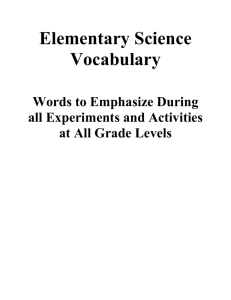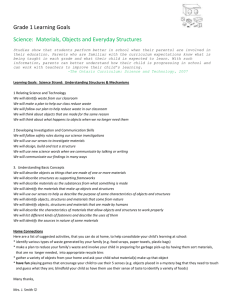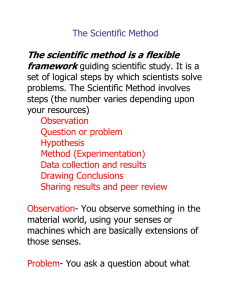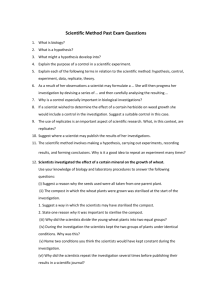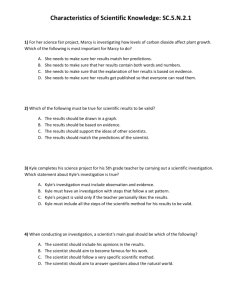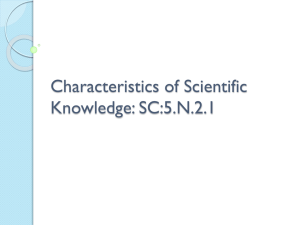Scientific Inquiry
advertisement
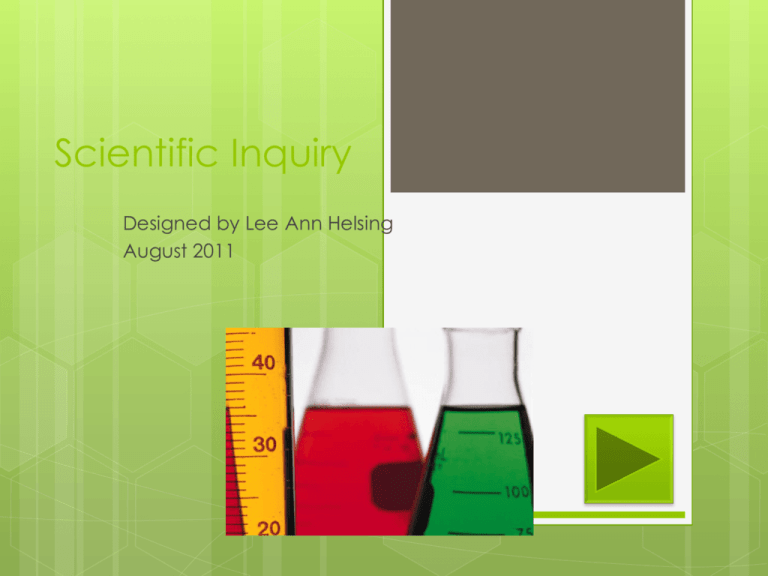
Scientific Inquiry Designed by Lee Ann Helsing August 2011 Goals: The main goal of this lesson is to teach students to use their five senses to complete a scientific investigation. Students will learn the steps to use in a scientific investigation. At the end of this lesson students will have an opportunity to choose an experiment to practice these skills. Standards: Scientific Investigation, Reasoning, and Logic: 1.1 The student will conduct investigations in which a)differences in physical properties are observed using the senses; b)simple tools are used to enhance observations; c)objects or events are classified and arranged according to attributes or properties; d)observations and data are communicated orally and with simple graphs, pictures, written statements, and numbers; e)length, mass, and volume are measured using standard and nonstandard units; f)predictions are based on patterns of observation rather than random guesses; g)simple experiments are conducted to answer questions; and h)inferences are made and conclusions are drawn about familiar objects and events. Take a minute to think about this question: What would it be like to be a real scientist? Do you have 5 senses? Can you use your 5 senses? YES! You are a scientist! You can use your sense of taste, touch, smell, sight, and hearing to make careful observations during a scientific investigation! Next Slide Watch this video about using the scientific method. http://www.youtube.com/watch?v=ytX- 0nxZUCk&NR=1&feature=fvwp Watch this video to hear a rap song about the scientific method. http://www.youtube.com/watch?v=8Xg4bI puvRw&feature=related Do you think scientists use tools? YES No I’m sorry, that is not the correct answer. Scientists actually use many tools to conduct an investigation. Please click the button below to learn more. Press Here for the Correct Answer Correct! Scientists use many tools to conduct investigations! These are just a few examples. Can you think of others? Let’s break this process down. What do you wonder about this experiment? Write your question down in your lab journal. Predict what you think will happen in the experiment. Write it down. Plan your experiment. What tools will you need? What are the steps? What questions do you want to answer. How will you present the information? Use your five senses to make careful observations. Record these observations in a science lab notebook. Record all of your observations. Reflect on this information and think about how it compares to your predictions. Have you answered your questions? Decide on a way to present what you have learned after completing this assignment. Think about what you have observed. Were your predictions correct? What have you learned? How are you going to share what you have learned with others? Let’s Practice Being a Scientist! Go to the following site to choose an experiment to complete with your small group. You must have your lab approved by your teacher before you begin. http://www.kids-science- experiments.com/ Bibliography This presentation was designed by Lee Ann Helsing. Videos: “How to Conduct an Experiment Using the Scientific Method.” Howcast.com. August 16, 2010. Online video clip. Howcast. 7 August 2011. http://www.youtube.com/watch?v=ytX0nxZUCk&NR=1&feature=fvwp “Scientific Method Rap Video.” FricknFrack 1000. October 10, 2010. Online video clip. You Tube. 7 August 2011. http://www.youtube.com/watch?v=8Xg4bIpuvRw&fe ature=related

